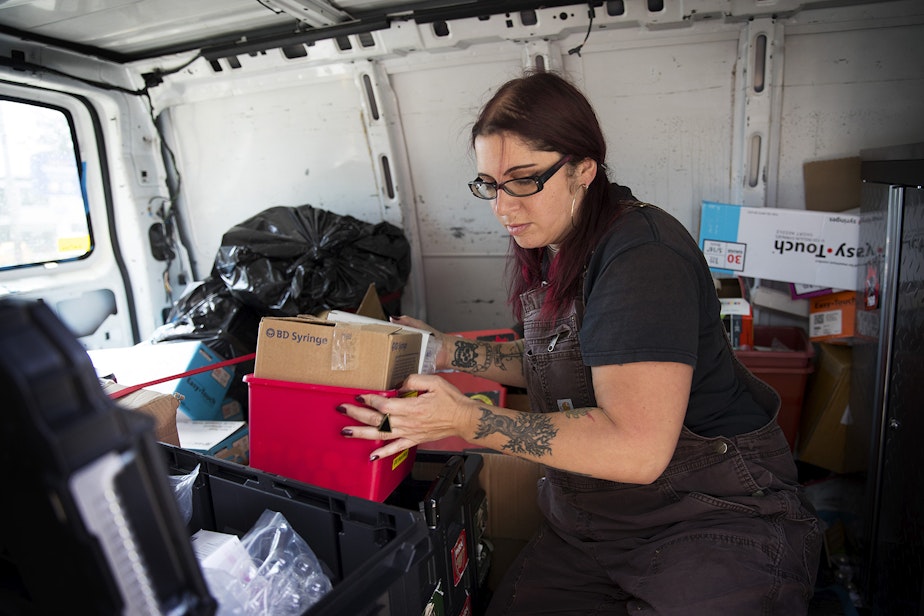After North Seattle's HIV outbreak, are other areas at risk?

Last July, a man who visited an emergency room with a fever tested positive for an acute HIV infection. He was homeless in North Seattle and he'd paid for sex with a woman who injected drugs. They would become known as patients 5 and 6 in a cluster of HIV that’s now infected 18 people.
Now some outreach workers are worried about the county’s ability to stay ahead of the virus.
The North Seattle HIV cluster represents a shift. Most victims are heterosexual people who are living homeless and injecting drugs. But the new infections come as no surprise to outreach worker Lisa Al-Hakim, who works at a syringe exchange van near 90th and Aurora.
She visits every Monday, but today there’s hardly anyone around.
“There’s usually like a ton of people here," Al-Hakim said. "The last time this happened they were giving out free shoes,”
Al-Hakim is a director at The People’s Harm Reduction Alliance, a group run by former and current users. She and others who provide support on this strip say they warned Public Health-Seattle King County for months that the lack of services in the north end made it ripe for HIV transmission.
Sponsored
Since the new diagnoses, Al-Hakim says the four blocks around 85th and Aurora have been flooded with health and syringe services.
“REACH is up there, LEAD is up there, Public Health is up there,” Al-Hakim said. There’s just a lot of services now, but I don’t think they leave that area.”
That means more people here will have access to health services and a drug that can significantly reduce the transmission of HIV. This is where the cluster started and Public Health is trying to keep it from spreading.
But Al-Hakim is increasingly worried about other places she runs her needle exchange: Kirkland, Fall City and areas around Kitsap County.
She sees a need for more services there, just like she did on Aurora, where she says ultimately the county's response came too late.
Sponsored
Public Health’s Dr. Matthew Golden, an infectious disease specialist who directs the HIV/STD program, says the county exchanged more than 7 million syringes last year.
“So we have been quite proactive but it's clear that it wasn't enough," Golden said. “Even though we were exchanging a lot of syringes they weren't necessarily hitting every part of the city. "
Golden says more syringe exchange services are needed everywhere. But he says syringe exchange is just part of the solution. Another big piece is to provide health clinics and other places that cater directly to this community.
“Part of the challenge here, and we're working on it but it's a tough one, is to optimally provide medical care to people who are living homeless really requires dedicated infrastructure,” Golden said.
Until recently, there was one place on Aurora that gave homeless people some stability and a place to connect with services: the Licton Springs Tiny House Village.
Sponsored
Hakim stopped here every week with her syringe van.
“When it came down that they were going to close, you could just see it on people's faces like that. It was just defeated all over again,” Al-Hakim said.
When the tiny house village experiment ended, the 40 or so people Al-Hakim was seeing here consistently are on the move again. Maybe she’ll see them at another stop, but she worry’s more that she won’t, and might mean more cases of HIV.
“Aurora’s a long street with a lot of activity that spans blocks and blocks and miles and miles and miles,” Al-Hakim said. “But it only takes one person to break off and start hanging around with a new group of people, and then it happens there. And then another breaks off and then it gets scary.”
On the street, relationships matter and trust doesn't come quickly. And keeping someone who’s homeless in treatment for HIV can be extremely difficult.
Sponsored
Health officials say of the 18 people in the original cluster one has died, one has moved out of state and 12 are currently taking anti-retroviral drugs. That includes Patient 6, the man from last July with the fever.
As for Patient 5, the HIV-positive woman he paid for sex with, Public Health reports she is not being treated.




